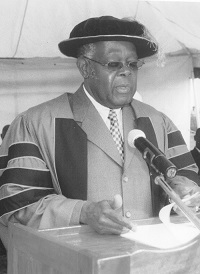In our segment “The Faces of Uganda” we feature a remarkable interview of Professor Fredrick Kayanja who is regarded by many as a revolutionist, a great thinker, an educationist, a living legend, and a grandfather of Mbarara University of Science, and Technology.
In his interview with EYIT TV, Prof. Kayanja discussed a range of topics including how he joined Mbarara University of Science and Technology, and the future of education, research, and innovations.
Full interview below;
Who is Professor Fredrick Ian Bantubano Kayanja
He was born on the 4th of August 1938. He received primary and secondary education at Kings College Budo and did extremely well. He did preliminary science courses taking Biology, physics, chemistry, and mathematics at Makerere University. He left Uganda after winning a scholarship and was admitted to the Royal Veterinary College of the University of London. He proved to be the best student in his class.
During his time as the vice chancellor of Mbarara University of science and technology (MUST), he was honored at the 3rd Uganda British Alumni Association Awards at the residence of the British High commissioner and received a lifetime achievement award. He received the highest academic award from the government of France.
He is the current chancellor of Gulu University, a public institution of higher education since October 2014. He’s a former vice-chancellor of MUST, a position he assumed in 1989 and retired in 2014.
He also served as the Deputy Vice-Chancellor of Makerere University from 1986 to 1988, the oldest and largest public university in Uganda. He is a parent, and a grandparent passionate about conserving the environment.
On where he was born.
I was born in Ruharo Mbarara, went to Kings College Budo, and was fortunately recognized by the British who were looking for youngsters to recruit and train, I was a very good footballer, and they took me.” Prof. replies. They provided all my education in the UK and the USA.
On how his whole life has been aligned with academia.
“I undertook veterinary training first because those who were paying wanted me to do so and my father was one of the earliest veterinary doctors in Uganda. After my pre-clinical in the veterinary course, I left for medical school and did human anatomy, I got a first-class degree, and returned to the veterinary school to finish the veterinary course. I later went back to medical school and completed the human medicine program.
The army took me to the Massachusetts General Hospital where I did my residency in orthopedics. Coming back to East Africa, I was an army officer but I had good training, and Kenyans recognized that. I taught at the University of Nairobi but eventually, I was asked to come to Uganda during the difficult time of Idi Amin. I had to evacuate my family at very short notice after Idi Amin discovered that I was both a university teacher and a British Army Officer. So rather than be killed, I was taken out and came back only after he had been overthrown.
On how he came to join Mbarara University.
I taught at Makerere University and became the deputy vice-chancellor in 1986, I was asked if I was interested in starting another university and was greatly encouraged by my colleagues to take up the opportunity and I took it.
I got support from the president of Uganda, H.E. Yoweri Kaguta Museveni, and the Government of Cuba for staff and initial equipment to start the medical school. “I became the vice chancellor of Mbarara University of Science and Technology from the end of 1988 to 2014.
On the challenges, he met as vice chancellor of Mbarara University of Science and Technology at that time.
Of course, there is no shortage of challenges, the only tragedy is that some people cannot overcome them. You must expect challenges and that is what life is all about.
I got support from H.E. the president of Uganda, the Minister of Education and Health, and Dr. Ronald Bate, the Resident District Commissioner at that time. That’s how I managed to overcome the challenges.
When asked to talk about the future of education, research, and innovation.
“Education is an eye opener to the individual and crucial in that aspect,” Prof. Replies
Research and innovations are very important, especially today but unfortunately, they have failed to understand that Uganda has got aspects of research that are unique, those that will succeed will only be those who recognize those aspects.
“Many of the students have good ideas but the problem is funds for research, an area that is not attractive to those who fund. They think it’s money being thrown down a deep hole and there is no end to that deep hole, but if you don’t take that risk, you will not succeed. We must learn to take that risk to give funds.” Professor notes.
Watch the full video to know all the universities he attended, and why he introduced Development Studies in a University that prioritized science education, when he was sick, he offered to be operated on at Mbarara Regional Referral Hospital yet they were offers from big hospitals like Massachusetts General Hospital and what people say about him:

